Tactical battles
The FIDE chess.com Grand Swiss is an eleven-round event that serves as qualifier to the 2020 Candidates Tournament. It takes place from the 10th to the 21st of October, with a rest day on the 16th. You can find more info here.
The top two pairings of round three had a 2664-rated player facing the latest challenger for the world crown on board one, and two compatriots of similar strength sitting close by on second board, their Elo ratings barely separated by five points. The encounter of board two was the one to finish first though, as Wang Hao needed no more than twenty-six moves to get the better of Bu Xiangzhi. At that point, Alexei Shirov and Fabiano Caruana were in the midst of a doubled-edged skirmish out of a Sicilian Defence.

Fabiano Caruana sharing a laugh with his second Rustam Kasimdzhanov | Photo: Maria Emelianova / chess.com
Shirov, who also was world number two some twenty years ago, went for the throat against his famed opponent. Opposite-side castling led to a fight for the initiative which required deep calculation. Caruana, who constantly takes part in elite events, handled his clock better, leaving Shirov at some point with less than a minute to make ten moves.
Caruana had allowed his opponent to get two pieces for a rook, but in return got a dangerous passer on the f-file and better chances against the opposite king:
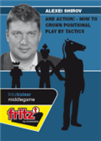 There are few names which, like that of Alexei Shirov, can be associated with fantastically imaginative and tactically influenced play. Now the Latvian grandmaster is presenting a DVD on precisely that element of the game of chess. And one that is completely based on his own games.
There are few names which, like that of Alexei Shirov, can be associated with fantastically imaginative and tactically influenced play. Now the Latvian grandmaster is presenting a DVD on precisely that element of the game of chess. And one that is completely based on his own games.
Shirov's previous 30.♖g3 was a mistake, as it allowed 30...♛e6 with alarming threats against the white king. The idea was to continue with 31.♗d3, when 31...axb5 or 31...♜e1+ would have increased Black's advantage. Instead, Caruana went for 31...♜e3, defending what he apparently considered to be his biggest asset, the f-file passer.
The position was sharply balanced according to the engines, but extreme precision was needed to avoid all pitfalls and Caruana was the one with a stronger initiative. The American kept finding ways to increase the pressure, until Shirov finally erred decisively:
Putting more hopes than they merited on his chances of finding counterplay on the kingside, Shirov played 48.g6, when 48.♕d7 is the only way to keep things under control. After the text, Caruana had 48...d2 49.♗f7 ♜e2, combining threats of promoting the pawn with potential mating ideas on b2. Three moves later, Shirov resigned.
In the diagrammed position, 48.♕d7 is better, as the white queen frees the diagonal for his bishop to relocate on b3, keeping an eye on d1 while blocking the b-file — the bishop thus becomes an effective defensive piece.

Alexei Shirov put up a great fight | Photo: Maria Emelianova / chess.com
Returning to the aforementioned Chinese duel, the proceedings in the very beginning of the game did not indicate this would be such a short affair...until Bu Xiangzhi opted for the strange-looking 9...f6, used in the recent past only by players rated around the 2100 mark. Wang Hao knew this move, but later confessed that he had forgotten his analysis — after spending close to half an hour, he played 10.d4.
The position seemed balanced enough, but suddenly Bu chose the wrong plan with 14...♞e5. A couple of moves later, Black was in deep trouble:
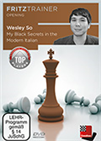 The Italian Game is considered a sound but quiet opening without early trades, giving rise to rich positions where plans are more important than forced variations. So shows black's plans on this DVD.
The Italian Game is considered a sound but quiet opening without early trades, giving rise to rich positions where plans are more important than forced variations. So shows black's plans on this DVD.
Wang's 17.c4 is a strong push. If Black captures twice the white rook goes to c1 with decisive effect, while the continuation of the game is quite forcing as well: 17...♛d6 18.♘g5, attacking the rook and the bishop. Bu found nothing better than 18...♝f5 19.♘xf7 ♚xf7, but not long afterwards his king fell prey to a white invasion on the kingside. Two more pawn advances decided the game:
In the previous diagram, attacking the queen with 17.c4 was the killer blow. Now came 24.b4 ♛e5 and 25.f4, harassing the queen once more. Bu resigned after 25...♛xe4 26.♖ae1.
When asked about his motivations in this tournament, Wang Hao clearly stated that he is in no way thinking about the Candidates Tournament, but instead simply looking forward to having "a good tournament". A sobering attitude from a seasoned professional.

Bu Xiangzhi versus Wang Hao | Photo: John Saunders
The chasing pack
Besides Adhiban, all those on 2½ out of 3 won their games in round three. Out of the nine encounters that left the winner a half point behind the leaders, perhaps the most exciting was Luke McShane's victory over Nguyen Ngoc Truong Son.
The Englishman tried his hand against the elite at the 2009 and 2010 London Classic, when he took the best game prize for his win over Hikaru Nakamura — he has also defeated Carlsen, Morozevich and Kramnik in the past. Known as the strongest amateur player in the world, he confessed that he is actually playing quite often this year.
Against the Vietnamese, McShane went all in for a kingside attack with the black pieces. By move 17, White was already far from comfortable:
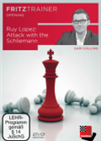 In this DVD Sam Collins provides a complete and detailed repertoire for Black. Numerous novelties and improvements are suggested, with the conclusion that White has no clear route to an opening advantage.
In this DVD Sam Collins provides a complete and detailed repertoire for Black. Numerous novelties and improvements are suggested, with the conclusion that White has no clear route to an opening advantage.
Nguyen played 17.gxh3, when it seemed necessary to block Black's light-squared bishop with 17.f5. When McShane got to play 21...f5 himself, the outcome was no longer in doubt:
Any pawn capture would lead to the rooks doubling up on the f-file, thus bringing all black pieces to the attack. In the game, White kept on fighting, but the task of preventing mate simply led to McShane simplifying into a winning endgame.

Luke McShane showing his game to Fiona Steil-Antoni | Photo: John Saunders
Some other well-known names are vying to join the leaders in the coming rounds after starting the tournament with two wins and a draw. Three Russians and two Indians are in the mix: Nikita Vitiugov, Vidit Gujrathi, Alexander Grischuk, Ivan Cheparinov, Gabriel Sargissian, Vladimir Fedoseev, Kirill Alekseenko and Parham Maghsoodloo. You can replay their round three games in the viewer below.
Click or tap any game in the list to switch
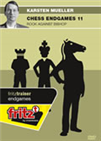 The more reduced the material, the more important it is to correctly assess the potential of your own and the enemy pieces. This is particularly true in endgames with unbalanced material. This DVD begins with a discussion of asymmetrical material balances, including
The more reduced the material, the more important it is to correctly assess the potential of your own and the enemy pieces. This is particularly true in endgames with unbalanced material. This DVD begins with a discussion of asymmetrical material balances, including
rook against bishop, rook and knight against two bishops, two rooks against rook and bishop, queen and rook against queen and bishop, rook and knight against bishop and knight, rook against two bishops.
Video running time: 8 hours 26 min.
Vidit kibitzing Adhiban v Radoslaw Wojtaszek | Photo: Maria Emelianova / chess.com
Update on the top guns
After getting inferior positions and one and a half points in the first two rounds, Magnus Carlsen could not convert from a position of strength against former FIDE World Champion Rustam Kasimdzhanov. Kasimdzhanov 'only' has a 2657 Elo rating, but is well-versed in the world of top-notch opening preparation, as he is currently Caruana's main assistant — he has also helped Vishy Anand and Sergey Karjakin in the past.
Four other players from the top ten are on 2 out of 3, like Carlsen, and three of them got wins on Saturday: Levon Aronian played a remarkable game with Black to beat Andrey Esipenko, Pentala Harikrishna outplayed Erwin l'Ami in a long rook endgame, and Sergey Karjakin got lucky against Rinat Jumabayev — the Kazakh grandmaster rejected a triple repetition while in a superior position, but blundered afterwards and did not even get a half point.

Pentala Harikrishna | Photo: Maria Emelianova / chess.com
Meanwhile, Vishy Anand and Wesley So, the top rated players competing for the Candidates spot, are sitting on an even 1½ out of 3 score. So will be playing Black against Norwegian champion Aryan Tari in round four, while Anand will have the white pieces against Romanian grandmaster Mircea-Emilian Parligras.
Commentary webcast
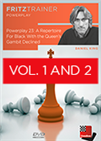 On this DVD, Grandmaster Daniel King offers you a repertoire for Black with the QGD and against the Catalan. The repertoire is demonstrated in 20 stem games, covering all White's major systems.
On this DVD, Grandmaster Daniel King offers you a repertoire for Black with the QGD and against the Catalan. The repertoire is demonstrated in 20 stem games, covering all White's major systems.Commentary by GM Daniel King and IM Anna Rudolf
Pairings for Round 4 (top 20 boards)
...77 boards
All games of Round 3
All games available at Live.Chessbase.com
Links
























